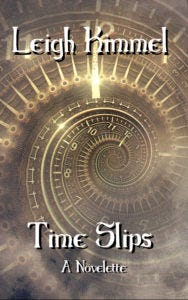Guest Post: Time and the Spacefarer
Please welcome a guest post by Leigh Kimmel. I'll have a guest post up on her blog today, as we swapped.
You should definitely check out her new book, too. Enjoy!

"Time is the fire in which we burn."
That line has become famous because of its use in Star Trek: Generations. It appears to be a throwaway line, used by villain Tolian Soran to manipulate Captain Picard by playing on the captain's grief for the deaths of his brother and nephew in a fire. However, when we look deeper we see that the line actually echoes throughout the movie, with its themes of time, loss and regret.
Soran is a literal mad scientist, having been driven over the edge with grief for his family. In his obsession with being reunited with them in the timeless Nexus he commits multiple acts of destruction, even to the point of being willing to annihilate an entire world of people in order to achieve his plan. Time has brought him nothing but destruction -- of his family, his home world, his people -- leaving him bitter and cynical.
By contrast, for Picard the destructive power of time takes the form of opportunities passed by, specifically his regret that his family line will now end with him because he chose to dedicate himself entirely to Starfleet while his brother married and had a family. Thrust into the Nexus, Picard experiences what might have been, had he made different choices years earlier. Whether opportunity or illusion, that entire scene of him as husband and father has an air of temptation about it. Will he indulge in the longing for might-have-been, or will he leave it behind to carry out his duties as captain of a Starfleet spaceship in the actuality his past choices created?
Furthermore, the entire movie represents the end of an era for the Star Trek movie franchise. The title Generations reflects the way in which the torch is being passed from Kirk and the rest of the crew of the Original Series to Picard and the crew of the Next Generation. As viewers, we are called upon to make peace with the passing of time and the endings it brings.
And the more I think about those ideas, I realize that similar thematic elements run through my new novelette "Time Slips." Rather than being about interstellar voyages, my story is about the early days of the US space program, but it too has the elements of loss, of time as destructive force.
The title actually came before the story, from a nerdy misreading of the name of a mundane piece of software for digital time sheets. It made me wonder what could cause a slip in time, and the question was still nagging at me when I saw a call for submissions of stories set in the 1950's, with elements of the Lovecraft Mythos. I'd been doing a lot of research on the Mercury astronauts at the time, and recalled that several of them mentioned in their memoirs that they'd seen UFO's, or at least objects in the sky that performed in ways no known aircraft could.
That led me to thinking about what UFO's might be in the world of the Lovecraft Mythos. What if they weren't actual aircraft, but an epiphenomenon of something completely different?
Given that the 1950's were also the era of Joe McCarthy and fear of Communist subversion, and I'd already written another story in which Communism was revealed to be a self-limiting tyranny created by eldritch entities to keep humanity in its place ("Red Star, Yellow Sign," published in the anthology Historical Lovecraft by Innsmouth Free Press), I began to see the connections that turn a collection of ideas into a story. As I wrote, the pieces began to fall together, and I ended up with a tale in which time itself can be manipulated by beings that may well pay us no more mind than we do a colony of ants.
Given that this story deals with the Mercury astronauts, the Apollo I Fire is an obvious element, but the real story is about lost pasts, whole worlds dissolving into nothingness as thoroughly as if they'd been burned to ash as the result of interference of mysterious entities that begrudge humanity the stars.
Obviously my take on the idea of time as consuming fire is a lot darker. However, one must consider that Star Trek falls squarely in the tradition of Hugo Gernsbeck, of a rational, knowable universe that humanity can master through the disciplines of science and technology. By contrast, the world of the Lovecraft Mythos, upon which I drew in writing "Time Slips," is fundamentally an irrational universe, in which the truth is often not merely unknowable, but too terrible to be apprehended by the rational mind.



